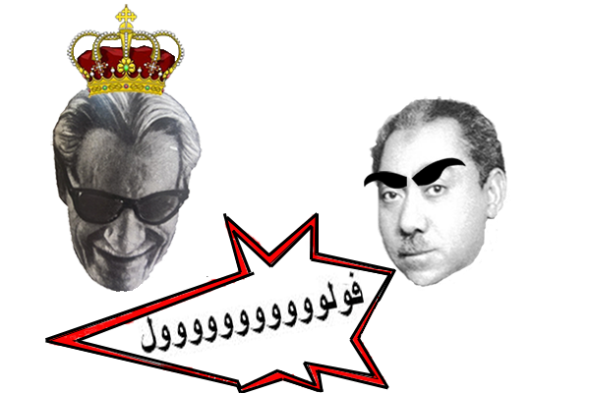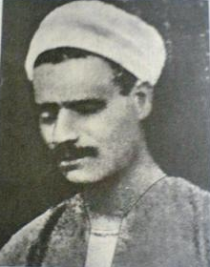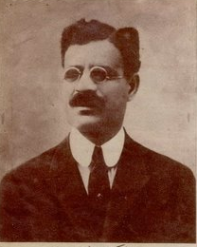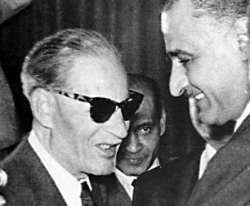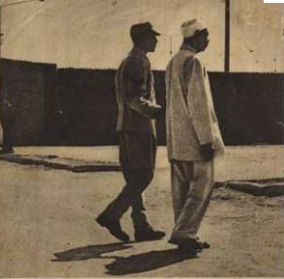One thing has always intrigued me while reading or listening to stories about Sayyid Qutb: that is, the boundless curiosity in his sexual life. There is a widespread opinion that Qutb’s mysterious private life is somehow responsible for his turn to Islamism.
In otherwise serious and academic biographies of Qutb, one could spot some by-the-way statements as “Sayyid Qutb probably died without even having had sexual relationships”. The current minister of Culture in Egypt has a more elaborated opinion on this subject. In a talk-show screened sometime ago on the Egyptian TV, he explained:
“He lived a full life. You will be surprised, but in his youth he was drinking and getting drunk. He knew women and girls. But he didn’t establish any full relationship with any woman. I’ve also read that when he was in the United States, a woman was pushed onto him and she discovered that he was not into this. And this made a big wound in his life. Also, he was ugly. And this, I think, was another problem for him, on the psychological level”.
Qutb was not into sex, the minister said. Surely, he was more interested in the fate of the humanity standing on the brink of a precipice, as he stated in the opening line of his infamous “Milestones”.

Why this dashing curiosity in Qutb’s sexual life, I wondered. One reason for this might be the fact that he never married. But was his bachelor life-style so exceptional in comparison with other writers of his time? It seems that the choice not to marry was rather a rule than an exception in Qutb’s literary circles. The prominent poet and literary critic ‘Abbas al-‘Aqqad, for example, never married, and openly expressed his contempt to women for whom he saw no other role than housework. The playwright Tawfik al-Hakim, labeled “the enemy of woman”, married in secret when he was about fifty, and only after his bride agreed to fifteen conditions of marriage listed in their contract. These included the interdiction to accompany him in public events, to fully take care of the house, and to stay silent in her room when the playwright was receiving the whiffs of inspiration. Following the romantic image of a genius writer, intellectuals of Qutb’s time seemed to despise the family life, and preferred to float above the boring lives of their mundane folks.

Tawfik al-Hakim chatting with a beautiful woman whom he would never marry
But there is another possible reason for their bachelor life-style: maybe there were no women to marry for those effendi writers. The first generation of modern-educated Egyptians did not have their female counterpart, as one captivating book explained. In the first half of the twentieth century, female education was a rare thing, and effendi writers upon their graduation found themselves lonely as a cloud wandering in the male-dominated world. Roughly, they had a choice between Westernised high-class girls, whom they saw as morally corrupted and not authentic enough, and peasant women, whom they considered as too authentic and lacking education. One of the rare examples of married writers of that time, Taha Hussein, didn’t seem to care about these limitations, and happily married a foreigner. Ahmad Amin, another married intellectual, narrates in his memoirs that finding a wife was not an easy task, it was indeed “a torture”.
Torture might be not the right word to describe the sentimental tribulations narrated by Sayyid Qutb in his romantic novel Thorns – as well as to describe my experience of reading it – but it’s the first one that comes to my mind. Written in 1947, Thorns marks a break from Qutb’s previous convictions about love and women, informed by his youthful love dreams and books. In the 1930s, he had written a series of articles entitled “Woman is a Simple Puzzle”, in which he invited writers of his time to stop representing women in their novels as a mysterious and incomprehensible beings. Some thirteen years later, when he was writing Thorns, Qutb discovered that the puzzle was not so easy to solve.

The advertisement of Qutb’s novel Thorns, published in al-Risala
In Thorns, Qutb narrates an anxiety-ridden love affair between a young clerk Sami, who learns about women only from books, and a girl named Samira, who has a tempting bosom. The story opens with their engagement scene in which Samira announces to the clerk that she had a love affair with a young officer. Torn between the impulse to preserve his dignity and his feelings of love, a tortious and detailed description of Sami’s inner anxieties unfolds. The whole relationship with the girl is a rollercoaster, in which Samy’s decision to marry Samira is constantly overthrown by his suspicions of her still being enamoured with her former lover. We see Sami changing his mind on a daily basis, when Samira, exhausted by this war of nerves, pulls back. (It’s also the war of nerves for the reader). In creating the character of this exceptionally indecisive man, Qutb uses some details of his personal life, which makes the readers believe that Sami is actually Sayyid Qutb himself. In fact, this is what Naguib Mahfouz affirmed in his rave review of the novel.

More importantly, in this novel Qutb gives a hint of a type of a woman that an effendi writer was about to marry. Apart of being blessed with a tempting bosom, we learn that she reads books, but only those that Sami provides her with. She reads them to please him, because “she knows his opinion about women who don’t read”. Sami, on his part, is conscious that by encouraging Samira to read, he’s turning her into a “complex and complicated woman”, who will be eternally alienated from her unsophisticated family members. She also plays a piano, creating tunes that captivate the young man. Despite of all this, Samira – at the height of her doubts on her suitability to marry Sami – suggests him to take her as a servant, because “she’s good in arranging the house”. Books, piano, household, former lover, engagement ring, tempting bosom, all this creates a puzzle that Sami – or Sayyid Qutb – is unable to solve. This novel makes it clear that problems Qutb might have faced in issues of love were rather psychological, than sexual, and that they most probably were shared by most of effendi writers of his generation. However, all these reflections are no more than hot air, when Egypt has a minister of Culture, who with the help of his rare insight into sexual problems of intellectuals of the 1950s – and maybe of all of us!! – can solve any puzzle for you.




